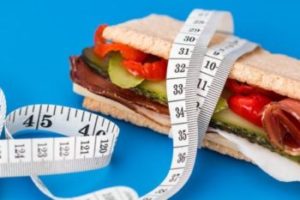
Have you ever thought…oh, counting calories sounds like fun! I think I’ll start doing that every day with every single thing that I put into my mouth. I’m certain this will help me meet my health and meal plan goals. It can’t be that hard…right?

There are mixed feelings about the benefits of calorie counting. Me, I’m not a fan, though I do believe there is a time and a place that it should be done. Let’s dive in and find out if counting calories is something you may want to consider.
What is a calorie?
A calorie is a unit of energy. It’s the energy of food! If you go a little deeper, 1 calorie is the amount of energy it would take to raise the temperature of 1 kilogram of water by 1 degree Celsius.
A calorie is a calorie whether it comes from an apple or a chocolate bar, but how the calorie works in your body is not the same. The energy the body receives from the calories of the food item are metabolized differently resulting in different outcomes. [1].
Calorie definitions aside, should you be counting them?
There are times that counting calories is beneficial to your health plan. Here is a list of when it might make sense.
- When you are having health issues and need to be aware of your calorie intake
- When you are training intensely for an athletic event, such as a marathon
- If you are new to watching what you eat and want to familiarize yourself with food items and how they are contributing to your meal plan
Why do these times make sense?
If you are having health conditions, it might be necessary to restrict or possibly increase your calorie intake for one reason or another. This would be something that is discussed with your doctor or perhaps a dietitian or other health practitioner, depending on the reason.
When training for an athletic event at a very high intensity, it is critical that you are receiving the right amount of energy to sustain you. This requirement will vary depending on the activity, so what a body builder would require will be different than what a marathon runner would require. Again, it would be a good idea to work with a professional to ensure you are meeting your needs which will enable you to perform at your peak.
Finally, if you are starting to watch what you eat on a much more focused level, but you haven’t done this before, it might be helpful to count calories in order to get an idea of how much you are able to eat. You might be surprised at what you learn.
Let’s talk more about this last one.
Where do you start when you are just getting started?
There are a few important things that will be helpful when learning about calorie intake and meeting your requirements. It is important that you get familiar with how you are currently eating, what real portion sizes actually look like and what your specific calorie needs may be for your lifestyle.
Start Here:
- For 3 days, write down everything you eat and the portion size. This even includes items like gum, hard candy or a tic-tac. If you can go longer, it will be more informative. If you are willing to do a little extra, write down the times you ate as well. Though this method is tedious and can be time consuming, if you are honest, it is eye opening in that it allows you to see your eating patterns. This will be helpful if you want to make changes and what area you should focus on first.
- Read labels and serve yourself the correct serving size. This may require measuring or weighing food in the beginning. You may be surprised at what one serving really looks like. Note that there is a difference between a portion size and a serving size.
- Figure out what your calorie needs are based on your lifestyle and goals.
Calculating calorie needs:
Calorie needs vary depending on what you want to accomplish. You may want to gain, lose or maintain your weight which would require different levels of intake.
There are a number of calorie calculators online that can give you a very general idea of what you may need. Remember, these calculators only have the most basic information about you, so they will not be 100% accurate. To get the most accurate calorie needs, it would be best to see a professional, such as a dietitian that can really break it down for you and help with a plan of action.
Here are a couple of calculator sites that may give you a general idea of your needs. If you try both of them, perhaps the average can get you started.
http://www.checkyourhealth.org/eat-healthy/cal_calculator.php
https://www.mayoclinic.org/healthy-lifestyle/weight-loss/in-depth/calorie-calculator/itt-20402304
Where to go from here?
Once you have identified patterns and have a general idea of what your needs are per your personal goals (weight loss, maintenance or weight gain), you can start making the necessary adjustments. As you meet your goals and set new ones, be sure to re-evaluate so you can stay on track.
These days, many people enjoy using Apps to help keep them accountable. There are a number of different Apps available, so find one that you like and that will help you continue to move toward your goals.
Now that you have an idea of how calorie counting may be beneficial, it’s in your hands. It’s important to do whatever it is that will help you the most and that you will stick with, otherwise you may get frustrated and quit. Remember, if you choose to count calories, it doesn’t have to be forever. After a period of time, you will become familiar with portion sizes and approximate calories and then you don’t have to be so on top of it anymore.
To count or not to count, it’s up to you!